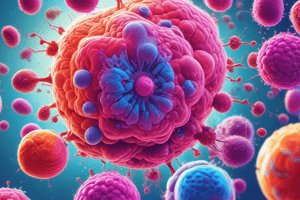Podcast
Questions and Answers
What is the primary function of mobile cells in relation to blood?
What is the primary function of mobile cells in relation to blood?
- To produce antibodies
- To inhibit blood clotting and dilate blood vessels (correct)
- To transport oxygen
- To aid in digestion
Where are plasma cells typically located?
Where are plasma cells typically located?
- In the brain tissue
- Within the bloodstream
- In the intestinal walls (correct)
- Close to lymph nodes
What transforms B-Lymphocytes into plasma cells?
What transforms B-Lymphocytes into plasma cells?
- Activation by foreign materials (correct)
- Exposure to viruses
- Contact with antibodies
- Interactions with other white blood cells
What do antibodies do in the immune response?
What do antibodies do in the immune response?
Which of the following is NOT a characteristic of mobile cells?
Which of the following is NOT a characteristic of mobile cells?
What two main components make up tissues?
What two main components make up tissues?
What is one of the main functions of the extracellular matrix?
What is one of the main functions of the extracellular matrix?
Which organ system is predominantly formed by only one type of tissue?
Which organ system is predominantly formed by only one type of tissue?
How is histology primarily conducted?
How is histology primarily conducted?
Which of the following is a component of the extracellular matrix?
Which of the following is a component of the extracellular matrix?
In addition to mechanical support, how do cells interact with the extracellular matrix?
In addition to mechanical support, how do cells interact with the extracellular matrix?
Flashcards are hidden until you start studying
Study Notes
Mobile Cells
- Characterized by a granule-filled cytoplasm.
- Typically located near blood vessels.
- Secrete heparin to prevent blood clotting.
- Release histamine, which causes blood vessel dilation and increases blood flow.
Plasma Cells
- Develop from B-lymphocytes when activated by foreign materials.
- Function as small "factories" producing antibodies, which are critical for immune defense.
- Antibodies bind to foreign substances, preventing further harm and assisting in their elimination.
- Commonly found in the intestinal wall.
Histology Overview
- Histology is the study of tissues and their arrangement to form organs.
- The term derives from Greek: "histo" (tissue) and "logos" (study).
Tissue Composition
- Tissues comprise two main components: cells and extracellular matrix (ECM).
- Initially regarded as separate, the ECM plays a crucial role in tissue structure and function.
Extracellular Matrix (ECM)
- The ECM includes various molecules, some organized into complex structures like collagen fibrils and basement membranes.
- Functions of the ECM include:
- Providing mechanical support for cells.
- Facilitating nutrient transport to cells.
- Removing metabolic waste and secretory products.
Cellular Interaction
- Cells not only synthesize ECM components but are also affected by them, indicating a dynamic relationship.
Organ Formation
- Most organs consist of multiple tissue types working together, with the exception of the central nervous system, primarily made up of nervous tissue.
Microscopy in Histology
- The microscopic size of cells and matrix components necessitates the use of microscopes for histological study.
Studying That Suits You
Use AI to generate personalized quizzes and flashcards to suit your learning preferences.




